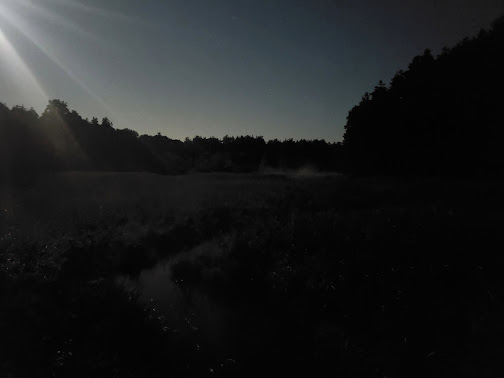Barred Owl Fledglings At Hopbrook Marsh
My hunt for a barred owl nest had lasted all spring, and I've had no success. By late July, I had pretty much given up. On July 31st, I went out at 10:30 at night, searching for eastern whip-poor-wills. SVT (Sudbury Valley Trustees) owns the land, called Hopbrook Marsh. SVT conducts prescribed burns on an area along the side of the marsh called the pine barrens. Pine barrens are a desert like habitat that can only be created in New England by burning an area. The results are a large, sandy area with lots of snags, and is usually dominated by pitch pine and scrub oak. This apparently creates an ideal breeding and nesting habitat for the whip-poor-will, A bird that I have not seen or photographed yet. Tonight was also important because whip-poor-wills are apparently most active during a full moon.
The moon was so bright that I could take this picture on my phone, of the marsh...
I walked along the railroad tracks that ran from Dutton Rd to the pine barrens. About a fifteen minute walk. Just like the month before, I did not hear any trace of a whip-poor-will call. I guessed that the info on the whip-poor-will's location i had received was out of date.
After a few minutes of exploring the barrens in near silence, I heard a very distant barred owl call. I knew that there was a pair of barred owls living in these woods, because I had heard them when I tried for whip-poor-wills the previous month. With my headlamp, I jogged for a bit in the direction of the calls. As I got closer, It became clear that there were 2 owls calling back and forth, while moving around in the swamp. I also heard a third call that I had never heard before. A very high pitched, soft screeching noise. I thought that maybe it was a screech owl? The sound kept repeating and repeating, and was coming from the exact same area that the barred owls were hooting in. I spend well over 15 minutes wandering around in circles, in the swamp, trying to find the source of the calls in the canopy. At one point, I almost caught up to the sound before the owl flushed. I watched it fly to another nearby tree. Another barred? I was surprised to see that a barred owl was making such such a soft, raspy noise. It made sense when i saw the owl's fluffy head, covered in down feathers.
I was looking at my first ever barred owl fledgling. Barred owl chicks usually fledge in May, so this one has probably been flying for at least 2 months. I took photos with my headlamp in one hand, and my camera in the other, which was a real challenge, especially since I was shooting at a shutterspeed of 1/40, and the camera shake that resulted from holding my camera with only one hand was blurring most of my photos. Eventually I tried lying down, and balancing my lens on my knee, while holding the headlamp against the lens hood, to keep it in line with my camera. I finally took the photo above and below before I looked up, and the owl was gone.
I started following the chick through the woods, as it flew from tree to tree with it's sibling, who was also screeching. I also noticed that they didn't seem to be trying to escape from me, and instead they were just trying to keep up with their parents, who were busy trying to catch food for them. While the fledglings were both letting out a repetitive screeching noise, begging for food, the adults would only hoot occasionally.
I was having a hard time finding them, especially since they were so high up in the trees. Eventually, at around midnight, they decided to take a break from moving, near a path. I finally had clear shots at both chicks, and an adult.
I finished the night at around 12:30, by taking video. I finally was able to focus on this fledgling before it took off, following its sibling. Volume up! I guess the chicks are also molting into adult plumage right now, because if you look closely, the fledgling drops a feather as it takes off...
It's annoying that I was only able to find the chicks after they had fledged, but I know the area now, so hopefully, I'll be able to photograph their whole nesting season next year.
.jpeg)


.jpeg)
.jpeg)
.jpeg)
.jpeg)
.jpeg)
.jpeg)

Comments
Post a Comment